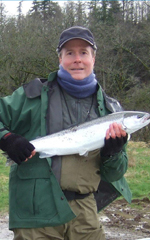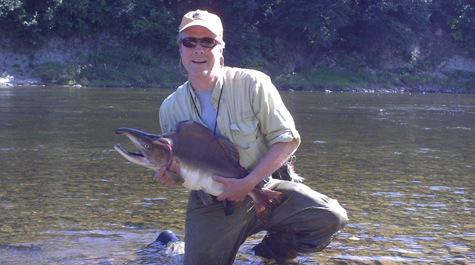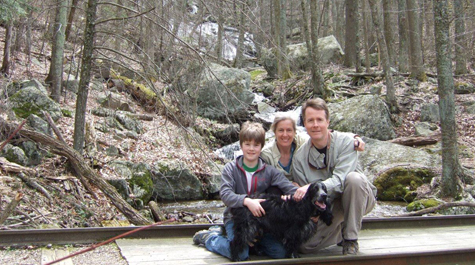Alumnus hired for prestigious “dream job”
VIMS alumnus John Field has recently been named the new Executive Secretary for the Pacific Salmon Commission in Vancouver, British Columbia.
The 1991 graduate of VIMS’ School of Marine Science made the move in August from Washington D.C. to Canada to head up the secretariat staff at the PSC—a position that VIMS Associate Dean of Academic Studies Linda Schaffner calls “a notable accomplishment in an already distinguished professional career.”
Since obtaining his Master’s degree at VIMS, Field has served in a variety of federal and interstate positions in fisheries management. His resume includes stints at the National Oceanic and Atmospheric Administration (NOAA), the Atlantic States Marine Fisheries Commission, the U.S. Fish and Wildlife Service, and his most recent position as Senior Foreign Affairs Officer for the Office of Marine Conservation at the U.S. Department of State.

Field admits having some reservations about leaving his colleagues and the rewarding work he had going on in the nation’s capitol. “While it was hard uprooting the life my family and I had known for so many years, sometimes life hands us opportunities that we just can’t pass up,” he says. “This was one of those opportunities.”
The PSC was formed in 1985 by the Canadian and United States governments to implement the Pacific Salmon Treaty—an agreement between the two countries to cooperate in the management, study, and enhancement of their shared Pacific salmon stocks. As Executive Secretary, Field oversees a staff of 25 scientists and administrators who assist the countries in implementing the treaty from Alaska to British Colombia and the U.S. Pacific Northwest.
“The Pacific Northwest is a remarkable place, especially if you are interested in anadromous fish,” says Field. “Salmon are woven into so many parts of society here, including U.S. Indian tribes and Canadian first nations, fisheries for people living in remote areas that depend on salmon for protein, and supporting the area’s economy. I love working in an area where fisheries are so prominent in day-to-day life.”
Fisheries are prominent in the day-to-day life at VIMS as well, and Field says the technical training he gained in Gloucester Point helped him understand the nuts and bolts of fisheries management. “The training I gained while earning my Master’s was indispensible because if you want to go into this field, it’s vital that you understand what your scientific advisors are telling you,” he says.
Field admits that the best advice he ever received was while he was still a high school student in Michigan. “A marine scientist told me to attend a college with a close proximity to a marine science lab and start working there during the summers to gain exposure to the profession,” he says. “By doing so, I was able to figure out where my interests lie and build a network while pursuing my undergraduate work.”
With this advice in tow, Field headed to Williamsburg to earn a B.S. in Biology at the College of William & Mary, and spent his summers working at the College’s School of Marine Science in Gloucester Point. “When it came time to choose where I wanted to go for graduate school, there was no contest,” he says. “VIMS just seemed to be the place I was destined to go.”
Field says the small campus feel and sense of community are instrumental in his love for his alma mater. “It was a very personable experience and I think it gave me some of the interpersonal skills I needed in my line of work,” he says.
Aside from the close relationships he shared with various faculty and staff at VIMS, his most cherished memories were in the field. “My absolute favorite memories came from doing my Master’s work on the tributaries of the York River and Chesapeake Bay,” he says.
Field’s research as a student under professor John Olney at VIMS focused on striped bass eggs in the Pamunkey River, a tributary of the York River. At the time, striped bass populations were in serious trouble and the fishery had collapsed along the East Coast, leading Field to reconfigure an underwater camera system as a means to sample striper eggs without causing any harm.
After earning a graduate degree and serving in various positions in fisheries management, Field has officially gotten his dream job at the PSC. “For the first time in my career I have the opportunity to help shape an organization and position it for the future,” he says. “It’s rewarding to have the skills I worked so hard to accumulate be tested like this.”
Field says the current students at VIMS should take pride in the reputation of their institution. “VIMS is a remarkable institution that continually grows stronger and more prominent, putting its students in a good position to get a job in fisheries or applied research in fisheries management upon graduating,” he says. “It’s a terrific place and they should be proud of their school and themselves.”


